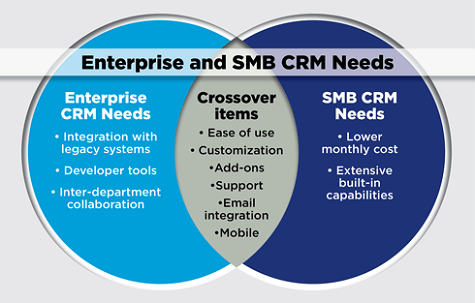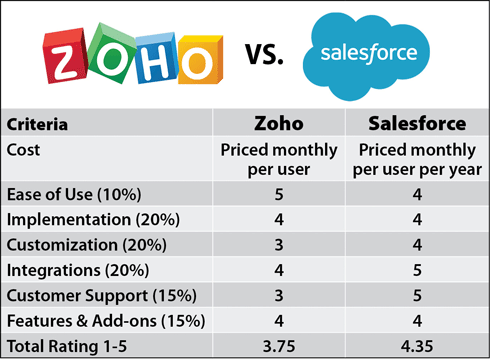Customer relationship management (CRM) applications have moved beyond being tactical tools for managing sales to become the primary means through which many organizations manage customer experience. The issue most organizations face today is not so much recognizing the business value of CRM applications, but rather rightsizing the level of investment to the size and scope of their operations.
CRM Needs in Large Enterprises vs Small Organizations
Large enterprises typically require a broad range of capabilities that include integration with a wide swath of systems-of-record that include, for example, supply chain applications and general ledgers. Small-to-medium-sized businesses (SMBs) tend to prefer CRM applications that are not only simple to invoke, but also come with the broadest range of built-in capabilities. Most SMB organizations, for example, don’t have dedicated marketing departments. Because of that issue, CRM applications that include built-in marketing tools that can be easily accessed by sales people tend to have more appeal.
Organizations should also be careful to choose a CRM application that sales people will want to use versus the one they think will help them best manage the business. CRM applications that sales people don’t find easy to use will eventually languish.
Two of the leading providers of CRM applications today are Salesforce and Zoho. With an eye toward appreciating the strengths of both offerings, what follows is an assessment of the two applications as they might appeal to different classes and sizes of organizations.
What are the Similarities & Differences between Zoho and Salesforce?
Cost
Salesforce Costs
Salesforce CRM is offered in four service levels. Salesforce Essentials, for up to 10 users, offers out-of-the-box CRM for $25/user/month. Lightning Professional is for teams of any size, at $75/user/month, and adds collaboration capabilities. Lightning Enterprise (the most popular, according to Salesforce) offers a highly customizable CRM for $150/user/month. And Lightning Unlimited, at $300/user/month, makes unlimited support available.
Zoho Costs
Zoho CRM offers a range of service levels that starts with a free version. Annually or monthly, small businesses can have up to three users on the completely free version, with basic CRM features for up to 5,000 records. The Standard version, at $12/user/month (billed annually) or $18/user/month, expands forecasting and reporting. The Professional version, at $20/user/month (billed annually) or $30/user/month, adds more customization in fields, workflow management and process management. And the Enterprise version, at $35/user/month (billed annually) or $45/user/month, is full-featured, including an AI assistant named Zia and enhanced analytics. Developer tools also are available at this service level.
Both Salesforce and Zoho are software-as-a-service (SaaS) applications that don’t require organizations to acquire dedicated infrastructure to run. But while both applications are priced on a per-user, per-month basis, Salesforce requires customers to commit to a yearly contract. The longer the contract commitment, the lower the monthly cost. The fees are charged upfront based on estimated usage. Zoho, in contrast, allows organizations to scale the number of users accessing its applications up and down on a monthly basis, as needed.
Cost-conscious companies will find that Zoho compares very favorably with Salesforce, not only on monthly charges, but in flexibility. This will often be important to companies experiencing growth. Salesforce CRM’s higher costs won’t necessarily turn off larger enterprises, in which the sales team is likely to already have familiarity with Salesforce tools.
Ease of Use
Both applications are generally well-received by the various market segments they target with different editions. The ability to navigate each application generally comes down to length of time any end user has been exposed to either one. The bar required to master Zoho is generally considered to be somewhat lower for the average end user. But some of the challenges end users might find with Salesforce are directly related to the number of features provided. Also, Salesforce is considerably farther ahead in terms of employing artificial intelligence (AI) capabilities that make the capabilities of the application much more accessible to a broader range of end users.
Implementation
As SaaS applications, both Salesforce and Zoho are relatively simple to invoke. But the Zoho applications make it easier to discover and turn on additional functionality.
Customization
Salesforce provides a broader range of tools for customizing its CRM applications. But the cost of that customization can be considerable in terms of pricing and level of expertise required to implement.
Integrations
Overall, Salesforce provides a broader range of tools for integrating its CRM application with a wide variety of data sources and complementary applications. But it’s also worth noting that many of the capabilities that Salesforce provides in another application that needs to be licensed are built into the core Zoho CRM application.
Customer Support
Salesforce has a much deeper investment in both the technical support it provides as well as a deeper bench of third-party service providers that can deliver not just technical support, but also customize Salesforce for use within any vertical industry segment.
Features & Add-ons
Salesforce has an edge in terms of the number of add-on modules it provides. But it’s also worth noting that Zoho makes add-on modules available for its CRM application at a more nominal cost.
Related CRM Comparison Articles
How to Decide which is Best for Your Situation
The one intangible thing many organizations fail to account for when deciding what CRM application to deploy is the degree to which sales managers already know how to employ one application versus another. The number of salespeople that are proficient in Salesforce far exceeds the number of salespeople that have mastered Zoho. While it’s always possible for sales people to master a new CRM, once they have become familiar with one application, most sales people show a strong preference for staying with the application they already know, whenever possible.
Another major factor is the size of the business. Application deployment projects involving Salesforce can easily exceed the resources and capabilities of a small business.
Recommendation for Small Businesses
Zoho CRM offers the combination of attractive cost range, including a free version, and ease of use that best suits small businesses and SMBs.
Recommendation for Startups
Zoho CRM best offers the flexibility that startups require to accommodate growth.
Recommendation for Real Estate
Real estate-related organizations that have an experienced, self-starting staff will enjoy a faster ramp-up toward increased efficiency with Salesforce CRM.
Regardless of the path chosen, just about every business will be better managed for having adopted a CRM application.




